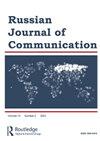Bodies’ voices: bodily capitalization in Russian and British music video
Q1 Social Sciences
引用次数: 0
Abstract
ABSTRACT The article presents the results of a comparative visual analysis of popular Russian and British music videos. The sample was based on the most viewed music videos on YouTube in 2019. The authors used the modern interpretation of Bourdieu's theory of capital as a theoretical framework for analysis. Bodily capital is considered as an independent type of capital that has physical, erotic, gender, and aesthetic dimensions. One considers that the capitalization of corporeality in a music video is connected with the plot visualization of the accumulation of bodily capital, i.e. the process of body transformation, by working on its physical features, constructing gender identity, modeling erotic behaviour, and aesthetic attributes of appearance. Moreover, the capitalization of corporeality in the video includes demonstration of obtaining direct or symbolic benefits resulting from the conversion of bodily capital into economic, cultural, or social capital. The crucial features of the capitalization of corporeality in Russian videos are the replication of markers of video characters' social status through body attributes, demonstration of aesthetically idealized bodies, and general irony over corporeality. In the British videos, there is less tongue-in-cheek narrative, especially associated with corporeal attributes; more unified body types are demonstrated.身体的声音:俄罗斯和英国音乐录影带中的身体大写
本文介绍了对俄罗斯和英国流行音乐视频的视觉对比分析结果。该样本基于2019年YouTube上观看次数最多的音乐视频。作者将布迪厄资本理论的现代诠释作为分析的理论框架。身体资本被认为是一种独立的资本类型,具有物理、色情、性别和审美维度。有人认为,在音乐视频中,肉体的资本化与身体资本积累的情节可视化有关,即身体转化的过程,通过对身体特征的研究,构建性别认同,塑造色情行为和外表的美学属性。此外,视频中的肉体资本化还包括将肉体资本转化为经济、文化或社会资本而获得直接或象征性利益的演示。俄罗斯视频中肉体资本化的关键特征是通过身体属性复制视频人物的社会地位标记,展示审美理想化的身体,以及对肉体的普遍讽刺。在英国的视频中,很少有半开玩笑的叙述,尤其是与身体属性有关的叙述;展示了更统一的身体类型。
本文章由计算机程序翻译,如有差异,请以英文原文为准。
求助全文
约1分钟内获得全文
求助全文
来源期刊

Russian Journal of Communication
Social Sciences-Political Science and International Relations
自引率
0.00%
发文量
0
期刊介绍:
Russian Journal of Communication (RJC) is an international peer-reviewed academic publication devoted to studies of communication in, with, and about Russia and Russian-speaking communities around the world. RJC welcomes both humanistic and social scientific scholarly approaches to communication, which is broadly construed to include mediated information as well as face-to-face interactions. RJC seeks papers and book reviews on topics including philosophy of communication, traditional and new media, film, literature, rhetoric, journalism, information-communication technologies, cultural practices, organizational and group dynamics, interpersonal communication, communication in instructional contexts, advertising, public relations, political campaigns, legal proceedings, environmental and health matters, and communication policy.
 求助内容:
求助内容: 应助结果提醒方式:
应助结果提醒方式:


